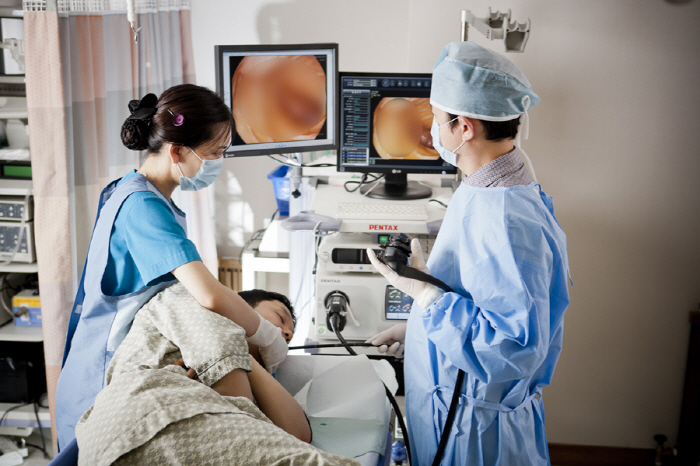It's annoying and troublesome? Gastric and colonoscopy, in this case, must be done
Sep 09, 2025
A medical examination is essential to detect dangerous diseases early and manage chronic diseases effectively. Diseases such as cancer, high blood pressure, diabetes, and hyperlipidemia have few special symptoms in the early stages, and the disease has often already progressed if an abnormality is felt in the body. Therefore, regular health checkups are the first step in 'prevention' rather than 'treatment' to detect invisible diseases in advance.
National health checkups and six major cancer checkups are representative health care systems supported by the government so that people can detect and prevent major diseases early. Since it is designed around diseases that have a high incidence rate and have a great effect on early detection, major diseases can be filtered by receiving only two checkups.
However, it is also good to choose a comprehensive health examination that includes additional examination items in consideration of personal circumstances (age, family history, lifestyle). In the national health examination, gastroscopy can be selected every two years, and colonoscopy can be selected if it is positive after fecal occult blood test, but it is safe to shorten the cycle in high-risk groups.
In gastroscopy, an endoscope is inserted through the mouth to observe the esophagus, stomach, and duodenum. Esophageal disease and gastric disease (gastric ulcer, stomach cancer), as well as oral cancer, laryngeal cancer, esophageal cancer, duodenal cancer, and Helicobacter pylori infection can be found.
Lim Joon-seop, head of the Center for General Health Examination at Seran Hospital, explained, `Although it was considered unnecessary to treat Helicobacter pylori until a few years ago, Helicobacter pylori is known to be the most important factor in the occurrence of atrophic gastritis, intestinal metaplasia, and gastric cancer, and if you have Helicobacter pylori, you must perform eradication treatment, and gastroscopy is essential to determine whether the bacteria are positive.'
Colonoscopy is a test that can be checked from the anus to the rectum to the entire large intestine. Colorectal polyps, a pre-stage lesion of colorectal cancer, can be found and removed, and it is also an essential test for diagnosing inflammatory bowel diseases such as diverticulosis, Crohn's disease, and ulcerative colitis. Gastric endoscopy and colonoscopy are very important tests that can directly observe and detect digestive diseases early. Early cancer detection as well as inflammatory bowel disease, hemorrhoids, ischemic colitis, mucosal atrophy, and intestinal metaplasia, which are pre-cancerous lesions, can be identified.
Gastric and colonoscopy are also the most reliable tests to directly identify the cause of gastrointestinal bleeding. Gastric ulcers and duodenal ulcers are the most common causes of upper gastrointestinal bleeding. Gastritis and esophagitis can cause bleeding due to damage to the mucous membrane, and gastric cancer and esophageal cancer are caused by tumor bleeding. Colonoscopy can identify diverticulum bleeding, a common cause of massive hemoptysis in middle-aged and elderly people, and rare causes such as intestinal tuberculosis can also be identified.
Lim Joon-seop, head of the center, said "Gastric and colonoscopy can not only identify the cause, but also treat hemostasis using an endoscope and resect polyps. Key tests that can find and treat the causes of gastrointestinal bleeding such as hemoptysis, bloody excrement, and hemoptysis are available. "It is reasonable to undergo both endoscopy at the same time because the incidence of both stomach and colon cancer increases after the 40s." If you have gastritis, polyps, and family history, it is safe to receive gastroscopy every year or more frequently."
National health checkups and six major cancer checkups are representative health care systems supported by the government so that people can detect and prevent major diseases early. Since it is designed around diseases that have a high incidence rate and have a great effect on early detection, major diseases can be filtered by receiving only two checkups.
However, it is also good to choose a comprehensive health examination that includes additional examination items in consideration of personal circumstances (age, family history, lifestyle). In the national health examination, gastroscopy can be selected every two years, and colonoscopy can be selected if it is positive after fecal occult blood test, but it is safe to shorten the cycle in high-risk groups.
In gastroscopy, an endoscope is inserted through the mouth to observe the esophagus, stomach, and duodenum. Esophageal disease and gastric disease (gastric ulcer, stomach cancer), as well as oral cancer, laryngeal cancer, esophageal cancer, duodenal cancer, and Helicobacter pylori infection can be found.
Lim Joon-seop, head of the Center for General Health Examination at Seran Hospital, explained, `Although it was considered unnecessary to treat Helicobacter pylori until a few years ago, Helicobacter pylori is known to be the most important factor in the occurrence of atrophic gastritis, intestinal metaplasia, and gastric cancer, and if you have Helicobacter pylori, you must perform eradication treatment, and gastroscopy is essential to determine whether the bacteria are positive.'
Colonoscopy is a test that can be checked from the anus to the rectum to the entire large intestine. Colorectal polyps, a pre-stage lesion of colorectal cancer, can be found and removed, and it is also an essential test for diagnosing inflammatory bowel diseases such as diverticulosis, Crohn's disease, and ulcerative colitis. Gastric endoscopy and colonoscopy are very important tests that can directly observe and detect digestive diseases early. Early cancer detection as well as inflammatory bowel disease, hemorrhoids, ischemic colitis, mucosal atrophy, and intestinal metaplasia, which are pre-cancerous lesions, can be identified.
Gastric and colonoscopy are also the most reliable tests to directly identify the cause of gastrointestinal bleeding. Gastric ulcers and duodenal ulcers are the most common causes of upper gastrointestinal bleeding. Gastritis and esophagitis can cause bleeding due to damage to the mucous membrane, and gastric cancer and esophageal cancer are caused by tumor bleeding. Colonoscopy can identify diverticulum bleeding, a common cause of massive hemoptysis in middle-aged and elderly people, and rare causes such as intestinal tuberculosis can also be identified.
Lim Joon-seop, head of the center, said "Gastric and colonoscopy can not only identify the cause, but also treat hemostasis using an endoscope and resect polyps. Key tests that can find and treat the causes of gastrointestinal bleeding such as hemoptysis, bloody excrement, and hemoptysis are available. "It is reasonable to undergo both endoscopy at the same time because the incidence of both stomach and colon cancer increases after the 40s." If you have gastritis, polyps, and family history, it is safe to receive gastroscopy every year or more frequently."
|
This article was translated by Naver AI translator.














